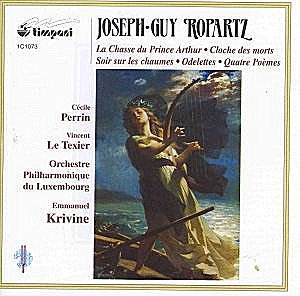Ropartz is a composer whose heritage is only
gradually being unfolded before us. Recordings have trickled out
over the years. But by now a search at fnac.com or amazon.fr will
throw up a largish number of discs. Timpaniís chamber music CD
is amongst the best - outstandingly imaginative stuff in the same
vein as the impressionist-romance of Cras and Foulds; their other
orchestral anthology from Ropartz is very low key stuff. The EMI
recording of the Third Symphony (now on líEsprit Francaise series)
is also well worth getting. This latest Timpani disc introduces
us to the solo vocal-orchestral Ropartz at much the same time
as Cyprès are treating us to a generous selection of Joseph
Jongenís songs with orchestra (CYP1635).
La Chasse du Prince Arthur glows
in sombre autumnal hues rather than the garish colours of high
summer. As an illustration listen, at 9.15, to the hooded tone
of the French horns. The work strikes me as indebted to Debussy's
La Mer (strikingly so at one point) but predominantly to
his maître César Franck. This is the Franck of the
desperately underrated Psyché and Le Chasseur
Maudit. The present work may not be completely unknown to
enthusiasts; it has for years circulated on the tape underground
in a 1950s performance conducted by Pedro de Freitas Branco.
The Debussy connection also sings out from the
Four Odelettes. Mlle Pérrin catches ideally
the Delian warmth and languor of these songs which teeter on the
edge of the solipsistic soliloquising of Pelléas et
Mélisande. This rises in Chant si doucement
to an ecstatic blaze and Perrin achieves some melting and softly
sustained high notes in Je n'ai rien que trois feuille d'or.
The cycle is not about dramatic scenas but poetic intensity. If
you know and like Bantock's Sappho Songs (on Hyperion)
then you need to get this disc. The Four Heine poems are
bookended by an orchestral prelude and postlude. Wounded and mournful
love is fully reflected in this wonderfully lugubrious cycle whose
vocal part is underpinned with bell evocations and references
to the Dies Irae. This is very much an inhabitant of the
lichen-hung land of Rachmaninov's Isle of the Dead and
Joseph Holbrooke's Ulalume. Vincent Le Texier's voice sounds
stressed and strained. I can imagine more controlled performances
but his feeling for mood is unerring.
Sur Les Chaumes is another late
romantic tone poem but more pictorial-atmospheric than La Chasse.
Les Chaumes are the upper summit pastures of the high hills of
the Vosges. The piece was written, like La Chasse and the
Odelettes, in the year before the Grim Reaper began the
slaughter in the trenches. Warm viscous blood moves through the
veins of this music which might remind you of Delius's Song
of the High Hills or of D'Indy's Jour d'Été
à la montagne. It has some cheeky jauntiness as well,
as for example, in the cloud-hung woodwind quick march at 6.29.
The clouds part and sun shines at 7.43 gradually igniting a densely
glowing Debussian climax. The music subsides in satiated exhaustion
into the hazy susurration of the strings - 'a drowsy numbness
pains the senses'. The rocking-breathing motif is not so very
far removed from the evocation of the murmuring sea miles in Gösta
Nystroem's Sinfonia del Mare.
La Cloche des Morts is the second
of three orchestral pieces on this disc. It is also the earliest
piece. Ropartz evokes, in shaded colours, a funereal Breton cortège
based, as was La Chasse, on the writings of Auguste Brizeux
(1803-1858). The style is caught between Tchaikovsky and Elgar
with a sizeable helping of Franck. The atmosphere is not the most
dynamic. The emphasis is on the expansive sunset rather than the
wave-battered coastline.
Full sung texts and translations are included
in the booklet. The outstandingly detailed and well balanced notes
are by the indefatigable Michel Fleury. The booklet includes an
interview with conductor Emmanuel Krivine.
This CD satisfyingly closes loopholes in the
Ropartz catalogue and does so in convinced and convincing style.
I hanker now for the Fourth and Fifth Symphonies and can only
hope that Timpani will not let us down.
Rob Barnett
